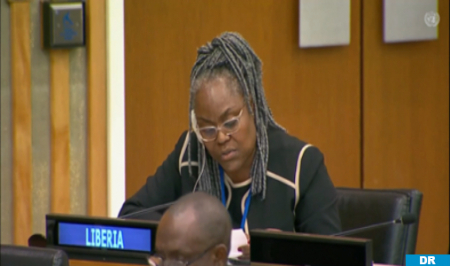Sahara: Liberia Voices Unwavering Support for Moroccan Autonomy Initiative, ‘the Most Credible Solution’
Liberia voiced in New York its “unwavering support” for the Moroccan Autonomy Initiative, deeming it “the most serious and credible compromised solution” to the regional dispute over the Sahara. Speaking at the annual meeting of the United Nations Committee of 24 (C-24), Liberia’s permanent representative to the UN, Sarah Safyn Fyneah, underlined that the Moroccan autonomy plan is compliant with international law, the UN Charter and resolutions of the UN Security Council, and the General Assembly. Mrs Fyneah, who underlined the increasing support for the Moroccan initiative, stressed that the total territorial integrity of all sovereign nations must be respected at all times, and fully upheld. She also warmly welcomed the effort of the Special Envoy of the UN Secretary-General, Staffan de Mistura, towards facilitating the relaunch of the political process under the sole auspices of the UN Secretary-General, including his visits to the region as well as the informal consultations he held in New York in March 2023. “Liberia encourages Morocco, Algeria, Mauritania, and the polisario to consistently remain engaged in the political process with the view to achieving a very realistic, practical and enduring solution, based on compromise to the regional dispute over the Moroccan Sahara, as mandated by the UN Security Council,” the diplomat pointed out. “We demand that the roundtable process, in accordance with UN Security Council Resolution 2654, be unconditionally resumed with the same four participants, namely: Morocco, Algeria, Mauritania, and the polisario, and in the same format,” she added. Liberia’s representative recalled the 2021 elections, which saw high voter turnout of 66.94% in Laayoune-Sakia El Hamra, 63.76% in Guelmim-Oued Noun and 58.30% in Dakhla-Oued Eddahab, as confirmed by both domestic and international observers, while hailing the participation of elected members of the Southern Provinces of Morocco in the UN Committee of 24 Seminar in in Bali, for the fifth time in a row, as well as in the two roundtables held in Geneva. “Liberia warmly recognizes the socioeconomic development of the Southern Province of the Moroccan Sahara, which includes the development of the Dakhla-Atlantic Port and the Regional Center for Investment in the Laayoune-Sakia El-Hamra Region; as well as the building of infrastructure and the creation of free trade zones at the Karkarat border crossing with Mauritania and the BirKunduz on the Dakhla-Oued Eddahab side”, she said. The diplomat stressed that her country welcomes the opening of over 28 consulate generals by African, Arab, American and Asian nations, as well as regional organizations in Dakhla and Laayoune, “as a major sign of support for the Autonomy Initiative”, adding that Liberia calls on all nations that value peace to follow suit. “We appreciate Morocco’s significant human rights accomplishments recognized by the UN Security Council resolutions, particularly Resolution 2602, which enhances the role of the regional commissions of the National Council for Human Rights in Laayoune and Dakhla and bilateral cooperation with the Office of the High Commissioner for Human Rights”, she said. Liberia applauds Morocco for fully adhering to the cease-fire in the Moroccan Sahara, and urges “all parties to do the same, because the security and stability of the entire region are at risk”, she stressed. The diplomat strongly condemned any restrictions on the MINURSO’s ability to move freely and supply its team sites. On the situation of human rights in the Tindouf camps, Liberia’s representative said that her country condemns “the breaches of the fundamental rights” of populations held against their will in these camps by the “polisario”, especially the women and children, and expressed “its great concern” for their predicament. In this regard, the diplomat underlined the urgent necessary imperative of moving forward with the registration of these populations in accordance with international humanitarian law, the mandate of the Office of the United Nations High Commissioner for Refugees, the Secretary-General’s recommendations, and all UN Security Council resolutions passed since 2011, including resolution 2654. Liberia also denounces the polisario’s abuse of peaceful populations living in the Tindouf camps, including their denial of humanitarian aid, as documented in the World Food Program’s Report, titled: “Evaluation of Algeria, the WFP Interim Country Strategic Plan 2019–2022”, and the European Anti-Fraud Office’s 2015 Report, she pointed out.

